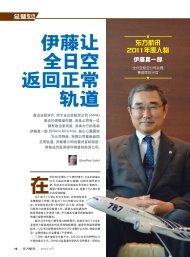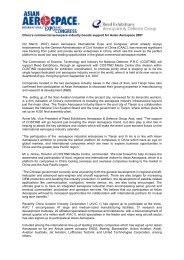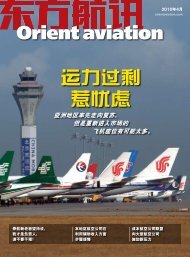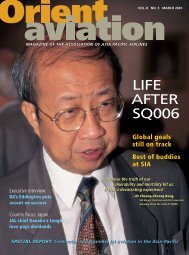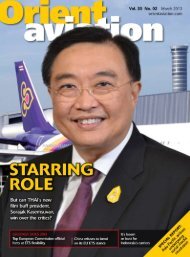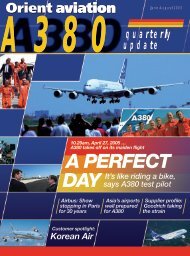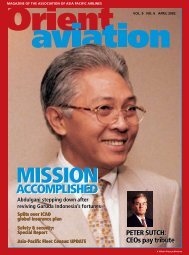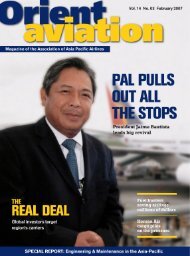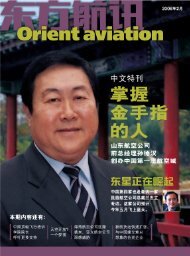You also want an ePaper? Increase the reach of your titles
YUMPU automatically turns print PDFs into web optimized ePapers that Google loves.
C o m m e n tNot surprisingly, the airway runningfrom Chiang Mai to Mae Hong in thenorth of Thailand does not figure inthe future network plans of the vast majorityof airlines in the Asia-Pacific. Yet it is a perfectexample of a malaise that continues todampen hopes that a number of carriers inthis region will ever be able to attain financialstability.Strangely, it also represents a reason whysome airlines don’t have a hope in Hades ofachieving what it is generally agreed theyneed to do; fundamentally and structurallyimprove their financial performance in thisnew, globalised world of ours.Even the International Air Transport Association(IATA), which represents airlines inthe world-wide arena, is convinced they haveto find new ways of doing business or theywill fall by the wayside.But how can they do that when somegovernments continue to talk about liberalisationand deregulation when, in reality, they areonly paying lip service to the concept?Let us return to Chiang Mai-Mae Hong. Itis a route served by national flag carrier ThaiAirways International (THAI) six times dailywith B737 jets. It also is unprofitable. THAIhas consistently lost a great deal of moneyon the flights. But Thailand’s domestic skiesare now, supposedly, deregulated, so THAIhas a solution. It will withdraw and handover the route to a small private carrier, AirAndaman.This would appear to be a good solution.THAI eliminates a loss-making route and asmall up-and-coming carrier, better able tooperate flights economically with smalleraircraft, acquires more business. THAI also willhelp the small airline with ground handlingand other back-up services, including puttingits flights into THAI’s reservation system.The people flying between these pointswill still have an air service, although it is estimatedone-way fares will rise marginally.Unfortunately, this is where economicrationality goes out the window. Local peopleprotest vehemently because they wanttheir jets, not little turboprops. With a bit ofpressure placed on the government it bucklesunder. Remember, the government is themajority owner of THAI. Bangkok orders itscharge to drop its plans. The governmentsays Air Andaman can provide supplementaryflights, but THAI must keep flying the route.This comes at a time when THAI has acritical debt/equity ratio of 11:1. It has accumulateddebt of nearly US$3 billion, lostUS$20 million in its first half to March 31 andis only just setting out on a restructure planShort-sighted govtsputting airlines at riskto try and turn things around.The chopping and changes on the ChiangMai-Mae Hong route is merely one exampleof the irrational economic behaviour of somegovernments in the region. Thailand hasrecently allowed a 4% increase in domesticairfares. Managers of the country’s airlines saythey need to push fares up by 50% to receivedecent returns from most of their routes.Malaysia and Korea also have given thego-ahead for small rises in fares, but theincreases will hardly allow the carriers tocover the cost of operation services. How caninternational airlines facing their highest everlevels of competition across the world’s skiesbe expected to succeed when they are beingforced to dig deep into their pockets to crosssubsidiselocal services?There is another point that has to be made.Can you deregulate fairly when one carrier isowned by the government? As the primaryshareholder in an airline, the government isunlikely to create a level playing field. Thisis why governments in countries such asAustralia and New Zealand privatised theirairlines as they liberalised aviation.Japan is an interesting market when itcomes to deregulation. Here was a country inwhich, throughout the 1990s, Japan Airlines,All Nippon Airways (ANA) and Japan AirSystem, lost millions as they operated in ahog-tied, restrictive environment.More than half of ANA’s domestic routes– it is the country’s largest domestic operator– were either struggling to reach break-evenor losing money. It could not dump routesbecause the government would not allow it.The airlines had a social obligation to provideair transport for remote communities.TURBULENCEBy Tom BallantyneBut now deregulation is allowing ANAand others to rationalise these operations and,along with other measures, has cleared theway for Japanese carriers to begin providingdecent returns to their shareholders.Yet in Thailand it is patently clear domesticderegulation is so lopsided that not one of thecountry’s fledgling airlines is able to take onTHAI on a single route. They have all carefullydesigned their strategies to avoid any paralleloperations with the national flag carrier. Thusderegulation is offering no real competition.Of course, governments have every rightto protect the position of groups within thepopulace and to ensure they have the sameaccess to air (and road and rail) transport aseveryone else.But there are ways of doing it that do notinclude driving a precious national asset, thecountry’s biggest airline, into the black depthsof financial deficit. If global markets, liberalisationand deregulation are to mean anythingthen airlines must be free to manage theirbusiness in a cost-effective way.As has been seen in a host of Asian countries,among them Indonesia, the Philippines,Malaysia and Thailand, allowing an airline tobecome a financial basket case ends up beingmore damaging to the economy than the costof social change which might see unprofitablejet services replaced by profitable turbopropflights.The point is those governments thatcontinue to force their airlines to operate in anegative commercial environment are goingto end up with no airlines at all. There is morethan one analyst in the region convinced thereare a few carriers that are going to be hardpressed to survive the decade.54 | <strong>Orient</strong> <strong>Aviation</strong> | September 2001



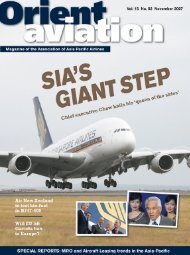
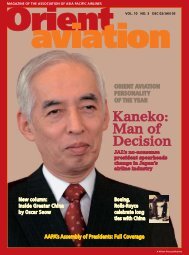
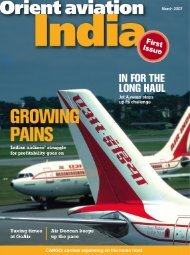
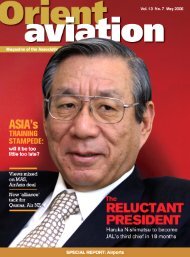
![OAMag-V7N4-Cover [Converted] - Orient Aviation](https://img.yumpu.com/48598575/1/190x255/oamag-v7n4-cover-converted-orient-aviation.jpg?quality=85)
